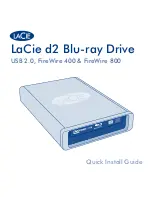
Glossary
page 64
LaCie d2 Hard Drive
User’s Manual
Kb (Kilobit) –
Equivalent to 1,000 bits.
Kb/s –
Kilobits per second. 480Kb/s is equal to 60KB/s.
KB (KiloByte) –
Basically, this means 1,000 bytes, but it is actually 1,024 bytes.
KB/s –
Kilobytes per second. A means of measuring throughput.
Mb (Megabit) –
Equivalent to 1,000,000 bits.
Mb/s –
Megabits per second. A means of measuring throughput. 480Mb/s is equal to 60MB/s.
MB (Megabyte) –
Basically means one million bytes, but is actually 1,024 Kilobytes or 1,024 x 1,024 bytes, which equals
1,048,576 bytes.
MB/s –
Megabytes per second. A means of measuring throughput.
Media –
The material or device used to store information in a storage subsystem, such as a tape cartridge, CD, DVD or disk
drive.
Operating System (OS) –
Software that controls the assignment and use of hardware resources such as memory, processor
time, disk space and peripherals. An operating system is the basis on which software (applications) run. Windows, Mac OS
and UNIX are among the most common.
Overwrite –
To write data on top of existing data thus erasing the original data.
Partition, -ing –
After formatting, the hard drive is not yet ready to store files. It must be divided into sections that will contain
special information required for a Mac or PC to operate and other sections that will contain the files. This process of dividing
up the hard drive is called partitioning. A partition is just one section of the hard drive that will contain either special data put
there by Silverlining or other files and data.
Peripheral –
A generic term applied to printers, scanners, mice, keyboards, serial ports, graphics cords, disk drives and other
computer subsystems. This type of peripheral often relies on its own control software, known as a peripheral driver.
Port, hardware –
A connection component (SCSI port, for example) that enables a microprocessor to communicate with a
compatible peripheral.
Port, software –
A memory address that identifies the physical circuit used to transfer information between a microprocessor
and a peripheral.
RAM (Random Access Memory) –
Generally referred to as a computer’s “memory.” An integrated circuit memory chip that
allows information to be stored and retrieved by a microprocessor or controller. The information can be stored or accessed in
any order, and all storage locations are equally accessible.

































